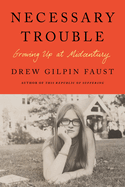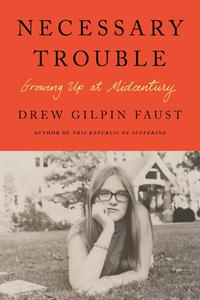
 The late Congressman John Lewis often talked about getting in "good trouble, necessary trouble" to effect social and racial change. Drew Gilpin Faust, Civil War historian and the first female president of Harvard University, borrows Lewis's words (once directed at her) for the title of her memoir, Necessary Trouble. Faust (This Republic of Suffering) describes her moral and philosophical awakening and paints a portrait of a midcentury world shaped by forces including postwar American prosperity, the fear of communism, the Civil Rights Movement, and the United States' doomed involvement in the Vietnam War. On her journey from a comfortable Virginia childhood to the all-female intellectual environments of Concord Academy and Bryn Mawr College, Faust learned to follow her conscience and to question the long-standing, constrictive traditions that governed the lives of Southern white women.
The late Congressman John Lewis often talked about getting in "good trouble, necessary trouble" to effect social and racial change. Drew Gilpin Faust, Civil War historian and the first female president of Harvard University, borrows Lewis's words (once directed at her) for the title of her memoir, Necessary Trouble. Faust (This Republic of Suffering) describes her moral and philosophical awakening and paints a portrait of a midcentury world shaped by forces including postwar American prosperity, the fear of communism, the Civil Rights Movement, and the United States' doomed involvement in the Vietnam War. On her journey from a comfortable Virginia childhood to the all-female intellectual environments of Concord Academy and Bryn Mawr College, Faust learned to follow her conscience and to question the long-standing, constrictive traditions that governed the lives of Southern white women.
Faust, a self-confessed tomboy, was often at odds with her socialite mother, who longed for her only daughter to be "a lady." With a self-reflective tone, the memoir's early chapters interweave Faust's family history with her childhood experiences: Faust examines her ancestry, with its privilege and tragedies, including her father's financial struggles, and the limits placed on women in her family. The narrative picks up speed when Faust moves north to attend Concord Academy in Massachusetts, which proved a dynamic training ground for her young mind. She chronicles her time there and at Bryn Mawr, detailing both dorm-room hijinks and serious academic pursuits at a time when most college women were still expected to become society wives. Faust knew, even then, that she wanted a different path for herself. She recounts several pivotal summer experiences, including a tour behind the Iron Curtain with an interracial group of young Americans and her participation in the Freedom Summer protests of 1964. These experiences, as well as Faust's growing conviction that the Vietnam War was unjustifiable, shaped her life and intellect, then and now. She details her intellectual and personal awakening alongside the growing complexity of the American political and social landscape.
Necessary Trouble shows Faust turning her historian's lens onto her own life: detailing the forces that shaped both her and her country, the strengths and weaknesses of the all-white intellectual environments that formed her, and the powerful sense of justice and the pursuit of truth that have come to define her life. Engaging and thoughtful, with vivid details and a wry sense of humor, Necessary Trouble is a nuanced portrait of midcentury America and an exploration of the ways it directly foreshadowed--and even created--our current political moment. --Katie Noah Gibson, blogger at Cakes, Tea and Dreams
Shelf Talker: Civil War historian and Harvard President Emerita Drew Gilpin Faust's engaging and thoughtful memoir chronicles her personal and intellectual awakening as a young woman.

